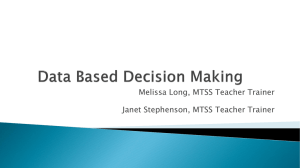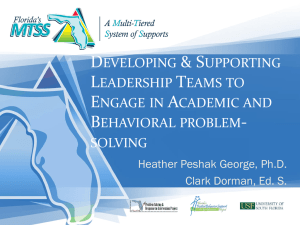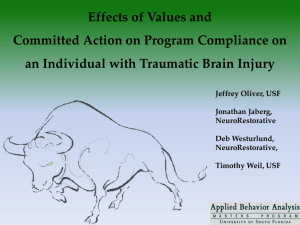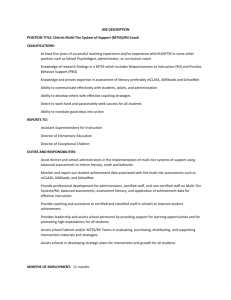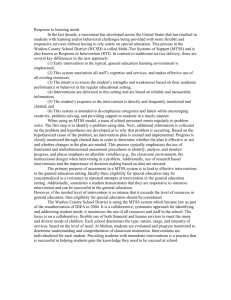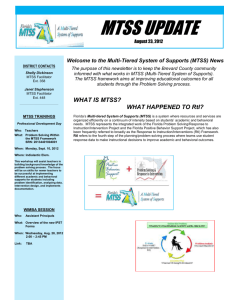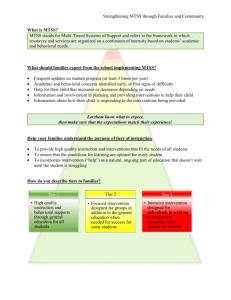(MTSS). - Florida Problem Solving & Response to Intervention Project
advertisement
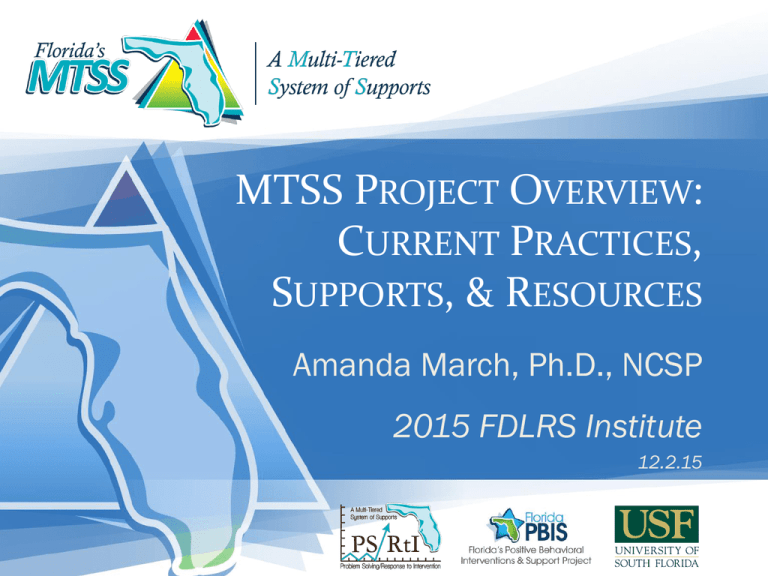
MTSS PROJECT OVERVIEW: CURRENT PRACTICES, SUPPORTS, & RESOURCES Amanda March, Ph.D., NCSP 2015 FDLRS Institute 12.2.15 Welcome! • Introductions • Current role and responsibilities? • Materials. • Expectations of presentation? • Questions before starting? 2 Proposed Learning Objectives • Understand mission of the the Florida Multi-Tiered System of Supports (MTSS) Project, a joint effort between the Problem-Solving/Response to Intervention (PS/RtI) and Positive Behavioral Interventions & Support (PBIS) Projects • Identify core components and practices of MTSS • Demonstrate understanding of Projects’ approaches to training, TA, and coaching • Access and discuss Projects’ resources, tools, and materials to be used and adapted for your role • Discuss how Florida discretionary project support personnel can collaborate to facilitate and sustain MTSS statewide Advanced Organizer • MTSS Component Overview • Inter-Project MTSS Project Mission/Vision • PS/RtI Project Way of Work – Goals, Resources, Contact Info • PBIS Project Way of Work – Goals, Resources, & Contact Info • Collaborative Discussions – How can we collaborate to support and sustain MTSS statewide? • Q & A, Additional Resources Norms: The “A E I O Us” A few agreements for our work together: • Ask questions • Engage fully • Integrate new information • Open your mind to diverse views • Utilize what you learn Group Discussion How would you describe a Multi-tiered Systems of Support (MTSS)? In your current role, describe your responsibility to support MTSS implementation and sustainability. 6 Critical Components of MTSS Multiple Tiers of Instruction & Intervention Problem Solving Process Data Evaluation Leadership Capacity Building Infrastructure Communication & Collaboration MTSS is a framework to ensure successful education outcomes for ALL students by using a data-based problem solving process to provide, and evaluate the effectiveness of multiple tiers of integrated academic, behavior, and social-emotional instruction/intervention supports 7 matched to student need in alignment with educational standards. Traditional vs. Response to Intervention J L Intervention Intervention Traditional - Get Label Problem Solving J L Monitor Progress Problem Solving J L Response to Intervention - Get Help J L Consider ESE Monitor Progress Problem Solving J General Education Consider ESE if necessary Problem Solving Organizational Improvement Through a MTSS Framework FRAMING THE CONTEXT: A LITTLE HISTORY Parallel RtI:A & RtI:B? Integrated MTSS? Siloes of Service Delivery Academic Integrated Service Delivery Behavior 10 Toward an Integrated MTSS • RtI and PBIS have similar components, features and complement each other (Sugai & Horner, 2009; McIntosh & Goodman, In Press) • Critical role of data-based decision-making (Forman & Crystal, 2015; McIntosh et al., 2013; NASDSE, 2006) • Value for implementation science (Forman & Crystal, 2015; USDOE-OSEP, 2010) 11 Facilitating MTSS Implementation • Both FL PBIS & FL RtI want to: – Develop district organizational capacity to… – …establish a three-tiered model of service delivery… – …that is driven by a data-based approach to decisionmaking, and used to… – …evaluate the efficiency and effectiveness of evidencebased practices on student outcomes. • Organizational “silos” as a barrier to implementing an integrated MTSS at the school level. – Can you provide any examples of this in your work? 12 Alignment and Integration are Needed • Many concurrent initiatives with limited resources commonly needed to implement all with sufficiency • Organizational “silos” as a barrier to efficient integration of resources • MTSS as a framework for alignment and integration of multiple initiatives that have common goals and implementation needs 13 FL’s Mission and Vision The collaborative vision of the FL PS/RtI & FLPBIS Projects is to: – Enhance the capacity of all Florida school districts to successfully implement and sustain a multi-tiered system of student supports with fidelity in every school; – Accelerate and maximize student academic and socialemotional outcomes through the application of collaborative data-based problem solving utilized by effective leadership at all levels of the educational system; – Inform the development, implementation, and ongoing evaluation of an integrated, aligned, and sustainable system of service delivery that prepares all students for postsecondary education and/or successful employment within our global society. Two Projects, Overlapping MTSS Goals Leaders as Coaches as Leaders… System Alignment & Integration We Coach Student (State) Classroom Leaders who Coach Building (District) Leaders who Coach (Principals & Coaches) District State Leaders who Coach (Teachers) Students & Parents 16 Leaders as Coaches as Leaders… System Alignment & Integration We Coach Student (State) Classroom Leaders who Coach Building (District) Leaders who Coach (Principals & Coaches) District State Leaders who Coach (Teachers) Students & Parents 17 The mission of the Project has evolved to focus on building Florida’s school district capacity to implement a MultiTiered System of Supports (MTSS). Five Units PreK-12 Alignment Unit Regional Support Unit Differentiated Accountability MTSS Unit Evaluation Unit Technology Unit *Inter-Project & Professional Learning (unofficial unit) PreK-12 Alignment Unit PreK-12 Alignment Unit Goals To build capacity of districts and schools to create an aligned PreK-12 educational system that maximizes student outcomes from PreK to postsecondary. Support to Stakeholders We support districts and schools throughout the state via professional development related to: Improving instructional practices Lesson Study STEM/Literacy instruction/intervention Identification of students at-risk for not meeting career and college readiness expectations Early Warning Systems Intensive interventions and specially designed instruction Developing integrated PreK-12 MTSS Support to Stakeholders In the 15/16 grant year we have provided or are currently providing training and/or technical assistance to the following districts: Baker Gadsden Jackson Levy Pasco Polk Lee Manatee Highlands Resources & Materials Early Warning Systems Fact Sheet http://floridarti.usf.edu/res ources/factsheets/index.h tml PreK-12 Unit Contact Info Amber Brundage- Unit Coordinator Abrundage@usf.edu Pam Sudduth- Literacy Learning & Development Facilitator psudduth@usf.edu Shelby Robertson- Mathematics Learning & Development Facilitator srobertson@usf.edu Jayna Jenkins- Learning & Development Facilitator jayna@usf.edu Regional Support Team Regional Support Team Goals Build district capacity to utilize problem-solving at the student and systems level establish and maintain an integrated Multi-tiered System of Supports SY 15-16 Areas of Focus 1. MTSS at the secondary level 2. MTSS, SWDs and Specially Designed Instruction 3. Aligning district/school initiatives and system structures for MTSS Implementation 4. Using MTSS to support SIP and DIAP implementation 5. Increasing Student Engagement with instruction Support to Stakeholders Provide targeted technical assistance, training, and products to district leadership focused on problem solving and the implementation of a comprehensive, integrated Multi-Tiered System of Supports District-level problem solving technical assistance and support Collaboration with and support to non-district stakeholders Facilitation of Regional MTSS PLCs State/regional/district level professional development Unit Contact Info Differentiate Accountability MTSS Specialist Unit Differentiated Accountability Regions Melissa Ramsey Wayne Green Ella Thompson Jim Browder Gayle Sitter DA Way of Work 1. Urgent Customer-Driven Support 1. PD to Practice 1. Strategic Goal Setting Systems thinking and alignment is the key to school and district improvement. Urgent Customer-Driven Support • Listening & Partnering • Connecting • Cross-Regional Convening • Like-District Convening • Cross-State • DOE Maneuvering • Collaboration • Enhanced Collegial Relationships • Assist with Strengthening of District Example: District Convening PD to Practice • Collaborative Development • System Aligned • Based on Identified Need • District Capacity Focused • Transfer of Learning into Practice for Sustainability • Follow-up Support for Implementation • Teacher Engagement • Increased Student Achievement Example: FSIC Example: Regional PD Requests Strategic Goal Setting • Strategic Planning for Continuous Improvement • • • • Systems Alignment Data-Driven Planning Problem Solving Implementation Support • • DIAP, SIP, TOP, SIG Progress Monitoring for Effectiveness • • Aligned to District System Feedback • As required for SIP, DIAP-1, DA-1 Checklist, DA-2 Checklist TOP, SIG, etc. Continuous Improvement Management System (CIMS) The Continuous Improvement Management System (CIMS) was developed by the Bureau of School Improvement (BSI) to provide districts and schools with an online platform for collaborative planning and problem solving. The system has continued to expand and now includes: Data visualizations for needs assessment and goal development School and district improvement plans School Improvement Grant 1003(g) proposals Title I, Part A application Registration for BSI-hosted professional development opportunities Resources, tools and guidance to support continuous improvement https://www.floridacims.org/cms Rule 6A-1.099811, Differentiated Accountability State System of School Improvement Form DA -1: Checklist For Districts with Focus or Priority Schools Form DA-2: Checklist For Focus and Priority Schools Form DIAP-1: District Improvement and Assistance Plan Form SIP-1: School Improvement Plan (SIP) Form TOP-1: Turnaround Option Plan – Phase 1 Form TOP-2: Turnaround Option Plan – Phase 2 http://www.fldoe.org/core/fileparse.php/9931/urlt/010902 1-1098811.pdf Example: CIMS Platform Example: Data Visualizations Example: Data Visualizations Technology Unit Technology Unit Goals Enhance the capacity of all Florida school districts to successfully integrate specially designed instruction, accessible educational materials, assistive technology, instructional technology, Universal Design for Learning, and virtual/online learning technologies in all tiers of a multi-tiered system of student supports. Technology Unit Goals Maximize academic and social-emotional outcomes through the understanding and implementation of Universal Design for Learning principles in all instructional data-based problem solving activities to ensure access, equity, and engagement for all students. Technology Unit Goals Inform the development and implementation of an instructional delivery system that: empowers students to become expert learners empowers students to independently selfproblem solve and self-determine instructional and accessibility needs/solutions prepares students for post-secondary education, successful employment, and successful participation in our global society Support to Stakeholders Internal Stakeholders Provide internal technical assistance to all units in the PS/RtI Project on integrating Universal Design for Learning principles in a multi-tiered system of supports. Collaborate with the FLPBS Project on using technology to support the development of positive academic and social behaviors. Support to Stakeholders BEESS/FLDOE Stakeholders Provide technical assistance to BEESS and discretionary project staff in accessible educational materials (AEM), assistive technology (AT), instructional technology (IT), Universal Design for Learning (UDL), and virtual/online learning (VI) technologies. Collaborate on BEESS Strategic Planning & Implementation Teams Support to Stakeholders BEESS/FLDOE Stakeholders Provide professional development support through: Train the trainer activities (e.g. AT in the Classroom) Training materials provided to discretionary project staff through the online loan library Collaborate with discretionary projects on professional development offerings: Working with the Experts – AT in the Classroom for OTs and PTs Project ACCESS / RMTC / FIMCVI – AT in the Classroom Project ACCESS – Environmental Communication Teaching Support to Stakeholders BEESS/FLDOE Stakeholders Support the development of communities of practice that include discretionary project staff and district/school staff through: The Statewide Technology Advisory Committee (TAC) Registrations for the Assistive Technology Industry Association Conference (ATIA) Network meetings at ATIA to support communication and collaboration between state and district stakeholders Fall and spring AT-AEM-UDL regional meetings to support communication and collaboration between stakeholders Listservs, Adobe Connect meeting rooms, Basecamp online project management services Support to Stakeholders District/School Stakeholders Professional development support through: AT in the Classroom Environmental Communication Teaching Universal Design for Learning (embedded, on the job professional development model) Reaching All Learners – Accessibility & Apple Devices Registrations for Local Assistive Technology Specialists and teachers to attend ATIA FETC, ATIA, FCEC, Family Café, and local hands-on technology labs Presentations at local and statewide events Support to Stakeholders District/School Stakeholders Technical assistance support through: Regional Local Assistive Technology Specialist services for small and rural districts Online Assistive Technology & Universal Design for Learning Loan Library to support AT assessments and UDL implementation On-site district and school consultation and TA activities Regional AT-AEM-UDL meetings Regional AT-UDL Centers Resources & Materials AT & UDL Loan Library Assistive technology UDL technologies Professional development resources AT&UDL Newsletters and Loan Library Newsletters Digital and printed handouts/resources on specially designed instruction, accommodations, AEM, AT, IT, UDL, and VI Teacher Resource CDs Student problem solving models to support selfdetermination and self-progress monitoring http://www.tlc-mtss.com/resources.html Unit Contact Info David Davis, Technology Team Coordinator david@tlc-mtss.com Judy Peacock, Region 1 Technology Coordinator judypeacock@usf.edu Gary Pearcy, Region 2 Technology Coordinator gmpearcy@usf.edu Janet Good, Region 3 Technology Coordinator jgood@usf.edu Tara Jeffs, Region 4 Technology Coordinator tjeffs@usf.edu Tony Dutra, Region 5 Technology Coordinator tdutra@usf.edu http://www.tlc-mtss.com/contact-us.html Unit Contact Info Loan Library Technology Specialists Linnzi Marks linnzimarks@usf.edu Nathaniel Drake draken@usf.edu Sam Jeanty samueljeanty@usf.edu Carlos Arredondo carredondo@usf.edu Unit Contact Info Regional Local Assistive Technology Specialists Saundra Brooker saundra.brooker1@jcsb.org Missy West Melissa.West@wcsb.us Cheryl Libbert libbert_c@firn.edu Teresa Pinder pindert@levy.k12.fl.us Kennon Alderman kennon.alderman@desoto.k12.fl.us Evaluation Unit Evaluation Unit Mission To provide the training, technical assistance and support necessary to facilitate: Project staff’s understanding of the basic tenets of program evaluation and of processes and procedures required for effective evaluation, Evaluation of the services provided to school and district stakeholders Project staff’s capacity to increase school and district stakeholders’ evaluation of MTSS implementation Support to Stakeholders Internal Stakeholders Provide internal technical assistance to all units in the PS/RtI Project on evaluating trainings and technical assistance sessions Collaborate with the FLPBS Project on evaluating MTSS at the school- and district-level Support to Stakeholders School and District Stakeholders Disseminate tools and products related to the evaluation of MTSS Self-Assessment of MTSS (SAM) Project Evaluation Reports Provide training and technical assistance related to the ongoing evaluation of MTSS Data collection and analysis support Resources & Materials PS/RtI Evaluation Tool Technical Assistance Manual http://www.floridarti.usf.edu/resources/program_evaluation/ta_manual_revised 2013/index.html Project Evaluation Reports http://www.floridarti.usf.edu/resources/program_evaluation/index.html Evaluation Tools http://www.floridarti.usf.edu/resources/program_evaluation/evaluation_tools/ind ex.html Presentations http://www.floridarti.usf.edu/resources/presentations/index.html Self-Assessment of MTSS Implementation (SAM) http://www.floridarti.usf.edu/resources/presentations/2015/fasp/justice2/handou ts/SAM.pdf Unit Contact Info Jose Castillo, Evaluation Unit Coordinator jmcastil@usf.edu Kevin Stockslager, Evaluation Specialist kstocksl@usf.edu http://floridarti.usf.edu/ PS/RtI Activity Matrix https://docs.google.com/spreadsheets/d/1Ck9RI7ymuTKnJgKlfuYHQVJzgI1etqCXa R8_cJC9-jA/edit?usp=sharing_eid PS/RtI Project Contacts http://www.floridarti.usf.edu/contact/contactinfo.html Inter-Project MTSS TA Contacts MAP http://www.floridarti.usf.edu/contact/mtss_ta/index.html Inter-Project MTSS TA Contacts MAP Example http://www.floridarti.usf.edu/contact/mtss_ta/index.html Florida Positive Behavioral Interventions & Support (PBIS) Project This product was developed by the Florida Positive Behavioral Interventions and Support Project, a project funded by the State of Florida, Department of Education, K-12 Public Schools, Bureau of Exceptional Education and Student Services, through federal assistance under the Individuals with Disabilities Education Act (IDEA), Part B. Two Projects, Overlapping MTSS Goals Florida’s PBS/MTSS Project Our Mission • Increase the capacity of Florida’s school districts to use teambased planning and problem-solving to implement positive behavior support within a multi-tiered system of support What we do… • Provide training and technical assistance to districts across the state in the development and implementation of positive behavior supports at Tier 1 (universal supports), Tier 2 (targeted group), classroom and Tier 3 (individual student) levels Tiers of PBIS Adapted from Levels and Descriptions of Behavior Support (George, Harrower & Knoster, 2003) • Tier 3 – (Individual) Processes and procedures reflect schoolwide expectations for student behavior coupled with team-based strategies to address problematic behaviors of individual students • Tier 2 – (Targeted Groups) Processes and procedures designed to address behavioral issues of groups of students with similar behavior problems or behaviors that seem to occur for the same reasons (i.e. attention seeking, escape) • Tier 1 & 2 – (Classroom) Processes and procedures that reflect school-wide expectations for student behavior coupled with preplanned strategies applied within classrooms • Tier 1 – (School-Wide) Procedures and processes intended for all students, staff, in specific settings and across campus Core Principles of PBS • • • • • • • Team process Facilitated leadership School and district action planning Data-based problem-solving Flexibility with fidelity of implementation Working smarter, not harder Emphasizing prevention, teaching and effective consequences Number of Schools Trained in Tier 1 April 7, 2015 • • • • • • 8 864 306 200 102 96 Pre-K Schools Elementary Schools Middle Schools High Schools Alt/Center Schools Other (e.g. K-8) • 1,576 TOTAL SCHOOLS Participating Districts Active Inactive 55/67 Districts 73% of Florida’s School Districts December 2014 PBS: RtIB Systems Implementation Logic https://www.pbis.org/blueprint/implementation-blueprint Funding Visibility Political Support Policy LEADERSHIP TEAM Training Coaching Behavioral Expertise Evaluation Local School/District Implementation Demonstrations (Implementers) (OSEP TA Center on PBIS, 2009) Training Provided • Tier 1/Initial (Universal Supports/Core) • Administrator • Implementation Planning/Booster/Refresher • New Team Member* • • • • • Coaching Classroom (Tiers 1 & 2)* Tier 2 (Targeted Group/Supplemental) Tier 3 (Individual Student)** * online only RtI:B Database* ** district level planning PBIS Workgroups • Disproportionality – Deliver problem-solving-based consultation to decrease discipline disproportionality, increase culturally responsive practices, & improve dropout prevention strategies in schools through collaborative partnerships with districts. – Defining Disproportionate Discipline: Understanding Common Measures • http://flpbs.fmhi.usf.edu/pdfs/Understanding%20Multiple%20Measures%20of %20Disproportionality.pdf • Early Childhood – Provide training & TA to districts interested in extending PBIS down to the Pre-K level & related early childhood programs. • Restraint & Seclusion – Establish partnerships with districts to develop, utilize, & maintain practices that minimize use of restraint/exclusionary crisis response practices while maximizing implementation of practices focused on crisis prevention. PBIS Workgroups, cont. • Program Evaluation – Supports provided to districts as part of their PBIS participation to evaluate the PBIS implementation status and related outcomes. • Checklists & Tools: http://flpbs.fmhi.usf.edu/ProceduresTools.cfm • Family & Community Engagement (FACE) – Provide training and TA to districts on how to involve family, youth, & community partners in the design, implementation & evaluation of PBIS at district and school level. • Resources for PBIS & Family: http://flpbs.fmhi.usf.edu/resources_family.cfm • Family & Community Engagement Innovation Configuration (IC) Map:http://flpbs.fmhi.usf.edu/pdfs/FACESchoolLevelIC_8-2115(002).pdf PBIS Workgroups, cont. • Applying Problem Solving to Classrooms (formally the Classroom Coaching Guide) – Provide & TA to districts interested in extending PBIS implementation at the classroom level. The CCG training module/package focuses on helping classroom teachers identify strength & areas of need with their classroom management systems. • provided resources & instruction for problem solving barriers to achieving effective classroom management systems aligned with school-wide PBS implementation efforts. Online Resources http://flpbs.fmhi.usf.edu/resources_classroom.cfm Online Resources http://flpbs.fmhi.usf.edu/resources_classroom.cfm PBIS Workgroups, cont. • Restorative Practices – Provide guidance, training, &/or supports to districts interested in identifying and implementing strategies, methods, or procedures for establishing positive & inclusive communities focused on building high quality relationships, clear limits/expectations, & teaching students how to solve problems appropriately. Establishing restorative practices in a district can help develop social & emotional competency among students. PBIS Workgroups, cont. • RtIB Database: https://www.flrtib.org – Provide training & TA to districts interested in accessing & using a FREE resource provided by the FDOE & developed by the PBIS project. • web-based data entry/reporting program that allows schools to enter various types of behavior data & generate various types of reports for the purpose of measuring effectiveness of their tiered system of behavior supports & student interventions. – Overview Video: https://usf.adobeconnect.com/_a825389370/rt ibmissionpossible/ PBIS Workgroups, cont. • Tier 3 for Behavior Redesign – Provide training & TA to districts interested in improving the efficiency & effectiveness of district-& school-wide tier 3 systems for behavior support Focuses heavily on building the internal capacity of a district to implement & use FBA/BIP process to guide team-based treatment decisions, encourage mental health supports, involve families & community agencies, & identify effective interventions for students with intense behavior or mental health needs. – “A Blueprint for Tier 3 Implementation: A Results-Driven System for Supporting Students with Serious Problem Behaviors”http://www.fldoe.org/core/fileparse.php/7690/url t/Tier3Blueprint.pdf – Technical Adequacy Tool for Evaluation (TATE) – Tier 3 Innovation Configuration (IC) Maps PBIS Workgroups, cont. • Inter-project MTSS Coordination – Help districts that are implementing both PBIS and RtI to integrate or align those efforts into one MTSS framework. This effort occurs through careful coordination of staff supports from both PBIS and PS/RtI Projects and supported by project leaders and related coordination staff. Within this coordination, topics such as integrating with school improvement, district strategic planning and problem solving, UDL and engagement, standards-based instruction, intensive intervention design, problem solving practices, and lesson study are highlighted as contexts to integrate or align academic and behavior systems of supports. PBIS Workgroups, cont. • Systems Coaching (Inter-Project) – Provide training & TA to districts interested in building the capacity of their district-wide PBIS implementation supports. Systems coaching involves a focus on building greater capacity of a district to provide ongoing, high quality, job-embedded PD, distribute responsibilities for PBIS implementation to ensure implementation progress, & involve multiple stakeholders in the implementation and sustainability of PBIS. Systems Coaching Definition Systems Coaching (v.): application of a set of skills and activities that provide dynamic support and facilitation to develop the capacity of school or district leadership teams to implement MTSS aligned with the school or district improvement plan in order to enhance student outcomes Tenets include: – Not necessarily a person, but a set of skills and activities coordinated by a team – There are some essential skills sets required of the leadership team to support and complete the activities – Leadership and coaching are both required for sustainable change. A reciprocal and functional relationship between coaching and leadership is needed to produce the desired outcomes of the organization Coaching Responsibilities 1) Demonstrate effective interpersonal communication skills 2) Use data-based problem-solving to answer a variety of questions 3) Disseminate evidence-based content knowledge a. Organizational Change/Implementation Process b. Integrated MTSS Three-Tiered Model c. Best Practices in Reading, Math, Behavior Instruction d. Best Practices in Family and Community Engagement (FACE) 4) Facilitate team-based collaborative problem solving 5) Support leadership team and staff capacity to sustain a MTSS 6) Provide professional development training and technical assistance 7) Evaluate the impact of coaching activities and supports 94 Systems Coaching Resources • Systems Coaching: A Model for Building Capacity • http://www.floridarti.usf.edu/resources/format/pdf/SystemsCoaching.p df • Systems Coaching Innovation Configuration (IC) Map • http://www.floridarti.usf.edu/resources/format/pdf/Systems%20Coachi ng%20IC%201.2015.pdf • Leadership Innovation Configuration (IC) Map • http://www.floridarti.usf.edu/resources/format/pdf/Leadership%20IC% 202.11.14.pdf 95 Next Steps • Systems Coaching Survey – Perceptions of Skills – Self Report – Aligned with the 7 Systems Coaching Domains – Individuals & Teams 96 Data-Based Problem-Solving Skills 100% 90% 80% 70% 60% 50% 40% NS MS 30% SS HS 20% VHS 10% 0% Your Your Your Your Your Your Your Your Your Your Your Your Your Your Your Your skill skill ability to ability to skill skill ability to ability to skill skill ability to ability to skill skill ability to ability to level level teach teach level level teach teach level level teach teach level level teach teach (Admin) (Other) this skill this skill (Admin) (Other) this skill this skill (Admin) (Other) this skill this skill (Admin) (Other) this skill this skill (Admin) (Other) (Admin) (Other) (Admin) (Other) (Admin) (Other) Employ the four-step problemsolving process that involves the following basic steps: Problem Identification, Problem Analysis, Plan Development and Implementation, and Plan Evaluation/RtI Accurately interpret different Accurately interpret different Collect data and monitor fidelity of sources and types of academic sources and types of behavior data the problem-solving process and data to support intervention design to support intervention design and student intervention plans and student outcomes student outcomes Leadership Skills 100% 90% 80% 70% 60% 50% NS MS 40% SS HS 30% VHS 20% 10% 0% Your skill level (Admin) Your skill Your ability Your ability Your skill level to teach to teach level (Other) this skill this skill (Admin) (Admin) (Other) Your skill Your ability Your ability Your skill level to teach to teach level (Other) this skill this skill (Admin) (Admin) (Other) Your skill Your ability Your ability level to teach to teach (Other) this skill this skill (Admin) (Other) Support school-based leadership in creating Support leadership to build and maintain Facilitate the distribution of leadership and articulating a clear vision with a sense of positive relationships among all educators, activities among a number of individuals (both urgency for PBS/MTSS and school students, and family and community members formal and informal leaders) improvement Archived PBIS Chats: http://flpbs.fmhi.usf.edu/Archived_Monthly_Online_Chats.cfm Content Resources Florida’s PBIS Project • Phone: (813) 974-6440 Fax: (813) 974-6115 • Email: flpbs@fmhi.usf.edu • Project Staff: http://flpbs.fmhi.usf.edu/aboutus_staff.cfm • State Website: http://flpbs.fmhi.usf.edu – FLPBS on FaceBook: www.facebook.com/flpbs – FLPBS on Twitter: www.twitter.com@flpbis • National Website: www.pbis.org • APBS: www.apbs.org Group Discussion • In what ways can PS/RtI and PBIS Project staff, resources, and materials support you and your Projects’ goals? • In what ways might we (discretionary project personnel) more efficiently and effectively collaborate to ensure common language/understanding for MTSS across FL? Support MTSS implementation & sustainability? 102 Questions & Discussion 103 Additional Resources • Myths & Truths about RtI – http://www.florida-rti.org/parentResources/myths/index.htm (Parent) – http://www.florida-rti.org/educatorResources/myths/index.htm (Educator) • MTSS: Common Language/Understanding: – http://www.floridarti.org/educatorResources/MTSS_Book_ImplComp_012612.pdf • Introductory video for parents about RtI/MTSS: – http://www.florida-rti.org/parentResources/videos.htm • Florida’s Problem-Solving/Response to Intervention Website: – www.floridarti.usf.edu • Florida Positive Behavioral Interventions & Support (PBIS) Project – http://flpbs.fmhi.usf.edu/ 104 Recent State & Federal Guidance Documents • FL DOE Technical Assistance Paper (TAP):Technical Assistance Paper General Education Intervention Procedures – http://info.fldoe.org/docushare/dsweb/Get/Document-7504/dps2015-151.pdf • FL DOE Technical Assistance Paper (TAP): Evaluation, Determination of Eligibility, Reevaluation and the Provision of Exceptional Student Education Services – http://info.fldoe.org/docushare/dsweb/Get/Document-7505/dps2015-152.pdf • US DOE IDEA Clarification & Guidance Doc – http://www2.ed.gov/policy/speced/guid/idea/memosdcltrs/guidan ce-on-fape-11-17-2015.pdf Thank You! Amanda March, Ph.D., NCSP Florida PS/RtI & PBIS Projects amarch@usf.edu @AmandaLMarch 106
